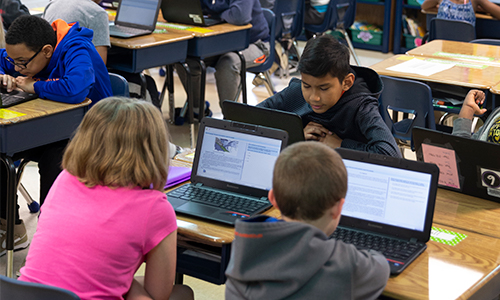Equity
It remains a critical challenge to ensure all children—regardless of race, ethnicity, gender, socio-economic status, and/or ability—have access to a high-quality education. We are at a pivotal time where communities and schools are navigating issues of equity, poverty, and opportunity gaps against a backdrop of shifting education policy. With access to exceptional data and a multi-disciplinary team of researchers and research partners, we are able to provide unique insight into these important issues.


The purpose of this technical appendix is to share more detailed results and describe the sample and methods used in the research in Progress towards pandemic recovery: Continued signs of rebounding achievement at the start of the 2022-23 school year.
By: Megan Kuhfeld, Karyn Lewis
Topics: COVID-19 & schools, Equity


New research provides evidence that student reading and math achievement at the start of the 2022–23 school year is continuing to rebound from the impacts of the pandemic, though full recovery is likely still several years away.
By: Karyn Lewis, Megan Kuhfeld
Topics: Equity, COVID-19 & schools


Technical appendix for: The widening achievement divide during COVID-19
The purpose of this technical appendix is to share more detailed results and to describe more fully the sample and methods used in the research included in the brief, The widening achievement divide during COVID-19.
By: Megan Kuhfeld, Meredith Langi, Karyn Lewis
Topics: COVID-19 & schools, Equity


The widening achievement divide during COVID-19
New research provides additional evidence of the uneven impacts of the COVID-19 pandemic showing that students’ math and reading test scores are more variable in spring 2022 than before the pandemic in part because the divide between high and low achievers has widened.
By: Karyn Lewis, Megan Kuhfeld, Meredith Langi, Scott J. Peters, Erin Fahle
Topics: COVID-19 & schools, Equity


COVID-19 in the early elementary years: A comparison of achievement in spring 2019 and spring 2022
New NWEA research provides further evidence of the challenges that young learners are currently facing from the disruptions of the COVID-19 pandemic.
By: Megan Kuhfeld, Karyn Lewis
Topics: COVID-19 & schools, Early learning, Equity


Longitudinal models of reading and mathematics achievement in deaf and hard of hearing students
New research using longitudinal data provides evidence that deaf and hard of hearing (DHH) students continue to build skills in math and reading throughout grades 2 to 8, challenging assumptions that DHH students’ skills plataeu in elementary grades.
By: Stephanie Cawthon, Johny Daniel, North Cooc, Ana Vielma
Topics: Equity, Measurement & scaling


Technical appendix for: Student achievement in 2021-22: Cause for hope and continued urgency
The purpose of this technical appendix is to share more detailed results and describe the sample and methods used in the research included in Student achievement in 2021-22: Cause for hope and continued urgency.
By: Megan Kuhfeld, Karyn Lewis
Topics: COVID-19 & schools, Equity


